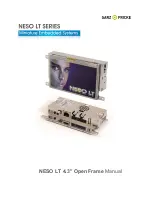
element (Bulb) of a non-operated Stealth Residential,
which is adjacent to one which has operated.
Heat Source Criteria.
Refer to NFPA 13D or NFPA 13R
for the requirements relating to preventing the possible re-
lease of a Stealth Residential heat responsive element
(Bulb), due to exposure to heat sources other than abnor-
mal fire.
INSTALLATION
The Stealth Residential must be installed in accordance
with the following instructions:
NOTES
Do not install any bulb type sprinkler if the bulb is
cracked or there is a loss of liquid from the bulb. With
the sprinkler held horizontally, a small air bubble with
an approximate diameter of 1/16 inch should be pre-
sent.
A leak tight 1/2 inch NPT sprinkler joint should be ob-
tained with a torque of 7 to 14 ft.lbs. (9,5 to 19,0 Nm).
A maximum of 21 ft.lbs. (28,5 Nm) of torque is to be
used to install sprinklers. Higher levels of torque may
distort the sprinkler inlet with consequent leakage or
impairment of the sprinkler.
All sprinklers installed within compartments having a
pitched ceiling with one or two parallel horizontal ceil-
ing ridges must be installed with their deflector arms
perpendicular to the ceiling ridges.
Failure to properly orientate the sprinkler frame arms
may result in impaired fire protection due to cold sol-
dering and/or inadequate spray coverage.
Do not attempt to compensate for insufficient adjust-
ment in an Escutcheon Plate by under- or over-tight-
ening the Sprinkler. Readjust the position of the sprin-
kler fitting to suit.
The Stealth Residential is inoperative while the Pro-
tective Cap is in place.
1. The sprinkler must only be installed in the pendent position
and with the centerline of the sprinkler perpendicular to the
mounting surface.
2. Remove the Protective Cap.
3. With pipe thread sealant applied to the pipe threads, and
using the W-Type 13 Wrench positioned as shown in
Figure 2, install and tighten the Sprinkler/Mounting Cup
Assembly into the fitting. The W-Type 13 Wrench will
except a 1-1/16 inch hex socket or a 1/2 inch ratchet drive.
4. Refer to Figure 1 and replace the Protective Cap by
pushing it upwards until it bottoms out against the Mount-
ing Cup. The Protective Cap helps prevent damage to the
Deflector and Arms during ceiling installation and/or during
application of the finish coating of the ceiling. It may also
be used to locate the center of the clearance hole by gently
pushing the ceiling material up against the center point of
the Cap.
5. After the ceiling has been completed with the 2-5/8 inch
(66,7 mm) diameter clearance hole and in preparation for
installing the Cover Plate Assembly, remove and discard
the Protective Cap, and verify that the Deflector moves up
and down freely.
If the Sprinkler has been damaged and the Deflector does
not move up and down freely, replace the entire Sprinkler
assembly. Do not attempt to modify or repair a damaged
sprinkler.
6. Screw on the Cover Plate Assembly until its flange comes
in contact with the ceiling.
Do not continue to screw on the Cover Plate Assembly
such that it lifts a ceiling panel out of its normal position.
If the Cover Plate Assembly cannot be engaged with the
Mounting Cup or the Cover Plate Assembly cannot be
engaged sufficiently to contact the ceiling, the Sprinkler
Fitting must be repositioned.
FIGURE 1
STEALTH RESIDENTIAL S240 CONCEALED PENDENT SPRINKLER
OPERATED
POSITION
NPT
1/2"
3/32" GAP
(2.4 mm)
3-5/16" DIA.
(84.1 mm)
ASSEMBLY
COVER PLATE
MOUNTING
SURFACE
SPRINKLER-
ASSEMBLY
MOUNTING CUP
ADJUSTMENT
THREADED
1/2" (12.7 mm)
(55.6±6.4 mm)
2-3/16±1/4"
SPRINKLER
FACE OF
FITTING
(66.8 mm)
2-5/8" DIA.
(4.8 mm)
3/16"
DISPOSABLE
CAP
PROTECTIVE
TIP
STAR SPRINKLER
1-3.1.11
Page 3
OBSOLETE

























